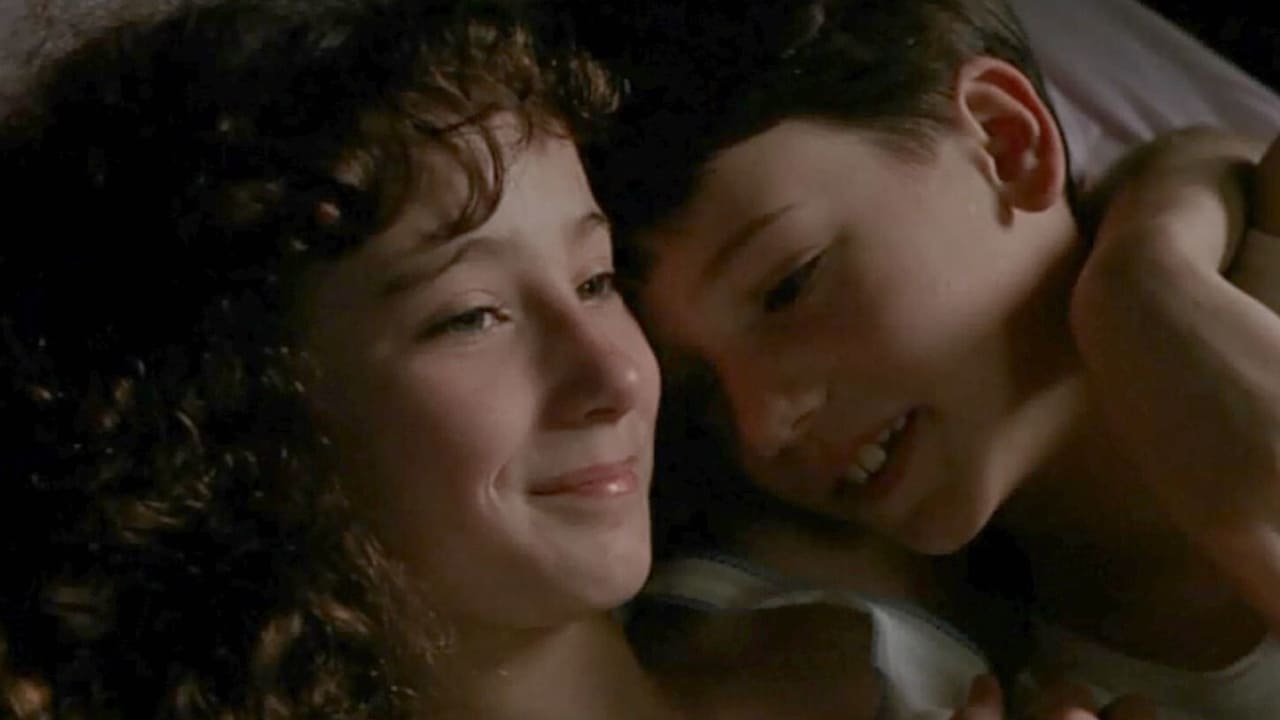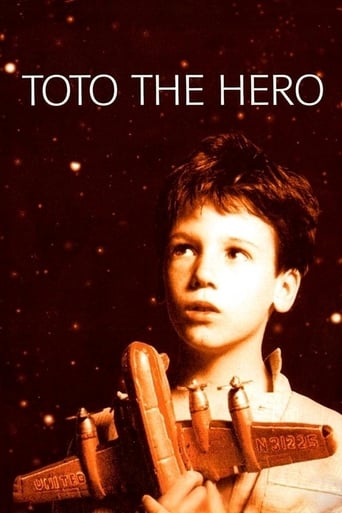

Cu-Top said it all. Only thing I can add is that it seems to start slowly and, if you have a prejudice against self-absorbed European (especially French) movies, this might suggest just another Celt trying to fellate himself.Instead, it turns out to be a virtually perfect story of self-deception and the choices that back-fire as a result, told at a deliberate pace, and which you care about because we all share some level of that deception.Again, Cu-Top's review hits the mark; take this little gem seriously.Another line.Another line.Another line.Why does IMDb insist on ten lines?
... View MoreUntil seeing this, I had never seen a belgian film before. I wanted to see it partially because of its nationality and partially because its cover is so stylish that I expected good surprises. In the end, I expected too much without properly informing myself.This film is nothing (and I mean, nothing!) of what it appears to be from the cover. That cover easily made me imagine a movie with space-age and futuristic visuals, a movie about a little boy who is a dreamer and often dreams of flying in space (imagining that was why he was holding an airplane in his hands). Well, in reality only 3 times there are scenes similar to that: early in the film when a space-like background with the title's film written in yellow appears; a ship shows up in a somewhat similar background; and after that only at the end when the same ship (from another angle of sight) appears in the same background.That said, this belgian motion-picture coproduced with France and Germany tells the weird tale of a bitter old man named Thomas (Toto) who looks back in time and laments his course of life. He shares his story through a complicated mosaic of flashbacks together with fantasies about what he wished his life had been.This movie makes use of admirable techniques such as a complex temporal structure combined with many dream sequences and many flashbacks. To make matters more difficult, sometimes the flashbacks flash simultaneously forward and back.Thomas was born around the same time as Alfred and has always envied him. Because he was never happy or lucky, he thinks Alfred stole his life and even believes they were switched at birth after a fire in the nursery.Although confusing and despite the incredible quickness of many shots, it's actually possible to understand well some parts.I see that many people here on IMDb have very positive things to say about this film. I'm sorry, but I have to disagree. I like strange and complex movies, but this one was too much even for my standards.What really shocked me was the disturbing things it contains. For example, Thomas is hungry for revenge and plans to murder Alfred. There is a scene when Thomas's father asks him to see his pretty airplane and the boy attacks him with the toy and the father bleeds. There is a scene when a woman starts bleeding from her head for no apparent reason. There is a child brother and sister in love with each other, they take baths together, sleep together and in one scene she keeps asking him opinions about parts of her body and he even gets to touch her boob. The children plan to burn the neighbor's house down. The girl even suicides by blowing up a house to show how much she loves the boy. The children destroy a statue of Our Lady. When grown up, Toto gets obsessed with another woman just because she looks like the sister who died in the explosion. And the movie displays (twice) a man that has been brutally murdered.Had they done this very (and I mean, very!) differently, and it could have been a great movie.
... View MoreThomas is a bitter old man who feels he has been cheated out of the life that was rightly his because he and another boy were switched at birth during a fire at the hospital. Alfred, the other boy, lives a life of privilege and becomes rich. Thomas is jealous. But in another sense Thomas needs to believe that he was switched because he falls in love with his sister Alice. If he really was switched, they are not related.This is just one of the ironic witticisms spun out by Jaco van Dormael, who wrote and directed this striking and totally original bit of life triumphant. Veteran French actor Michel Bouquet plays Thomas as an old man, sneaking cigarettes in the old folks home, reliving his memories, plotting his revenge. Jo De Backer plays Thomas as a slightly nerdish young man, consumed by the loss of his beloved sister in a fire when she was about eleven or twelve. One day by accident he spots a woman who reminds him of his sister. He follows her, they fall in love, and it turns out she is married to Alfred! Thomas Godet plays the little boy Thomas with charm and a touching vulnerability. He is picked on and bullied by Alfred and his friends who taunt him with, "van Chickensoup!" (I wonder if the French Academie approves of this vulgar Anglais.) Sandrine Blancke plays Thomas's cute and impish older sister. Mireille Perrier plays Evelyne, who is the woman who reminds Thomas of his sister.In a sense this is a romantic comedy, but be warned that in the French cinema a hint of incest is seldom looked on as shocking, rather as something almost akin to nostalgia. And certainly every woman should have a lover and every man a mistress. In another sense this is an art film that plays with time, using both flashbacks and flash forwards to present a story filled with spooky coincidences, punctuated with fantasy and a kind of naturalistic glorification of life epitomized in the catchy tune, "Boom!" that weaves its way in and out of the story, a tune you might have trouble getting out of your head, so be forewarned. ("Boom! When your heart goes boom! It's love, love, love!" written and performed by Charles Trenet.) There is also as aspect of sentimentality, especially in the resolution, that provides a sweet contrast with the naturalistic pathos. When the words that Alice spoke as a child is reprised by Evelyne (although she could not have known what Alice had said) we are delighted, and Thomas is a little rattled.. ("Do you like my hands?" she asks, holding them up. "Which hand do you prefer?")The bitter old man learns that he really had the better of it all along (and so he does somewhat the opposite of what he had intended) and indeed we in the audience realize that how we might feel about life, looking back on it, might really just depend on how we choose to feel about it. Dormael's message seems to be that love makes life worth living. We are left with the sense that there is a time for love, and that time passes, and we have to accept that and celebrate the memory.Best scene: Ten-year-old Thomas sees his perhaps 11-year-old sister rising out of the bath tub. (We see only his widening eyes; this is a discreet movie.) He says, "I...didn't know you had breasts." She replies (deadpanning the pride of a pre-adolescence girl), "I thought you'd read about them in the newspapers."(Note: Over 500 of my movie reviews are now available in my book "Cut to the Chaise Lounge or I Can't Believe I Swallowed the Remote!" Get it at Amazon!)
... View MoreJaco van Dormael, I love you. When I first saw this film in a dilapidated arts cinema in Cambridge on a cold winter's night, I wasn't expecting much. The only review I'd read was mildly sniffy. It was French, it was about la condition humaine. I thought it'd be a reasonable way to pass a couple of hours.When I emerged from that dark pit of a cinema, I felt, at least for a while, as if my eyesight had been transformed. As we walked back to my friend's flat, I became fixated on one thing after another - the rain upon the cobbles, the light on the church, the darkness of the sky - I felt about five years old all over again. Since then, this film has never been out of my top five. And probably never will.That is not say it's perfect. It's message is perhaps a little too bleak for my liking, and it does indulge itself in the precept that life it utterly meaningless. But how the visuals of the film contradict that sentiment! Every shot filled with colour, with life, with imagination.In a way, Toto is an old-fashioned film - a thriller in the Third Man/Citizen Kane mold - a complex story unfolding in a semi-linear fashion, in this case throughout one man's whole life. Dour realism this certainly ain't. A wonderfully naive 40s (?) style chanson reappears, as the adult 'Van Chickensoup' watches his dead father sing from the back of a truck in front of him. Flowers sway in time to the song. The child truly believes that his father met his mother by landing in the garden from a parachute. Scene after scene of joyful play follow each other.But this is no art-house foppery. This is a tight, mean, well-constructed tale about the feeling that dogs us all - is this all life is? Could I have been happier as someone else? Are they happier than me? Am I lucky or unlucky? And most importantly, this: Why, when life seems so hard at times, can we find so much joy in small things, in a flower, or a kiss, or crazy weather, or new clothes?Forget the French subtitles, a fact that seems to put off so many North American and British viewers, forget the 'art-house' tag. I own this film and have shown it to scores of friends, all of whom have walked away astonished at its vision. I assure you that you will love this film. It's alright, you don't have to thank me, spreading the word is enough. ;-) Watch it today! And then watch the Eighth Day, Van Dormael's astonishing second feature.
... View More